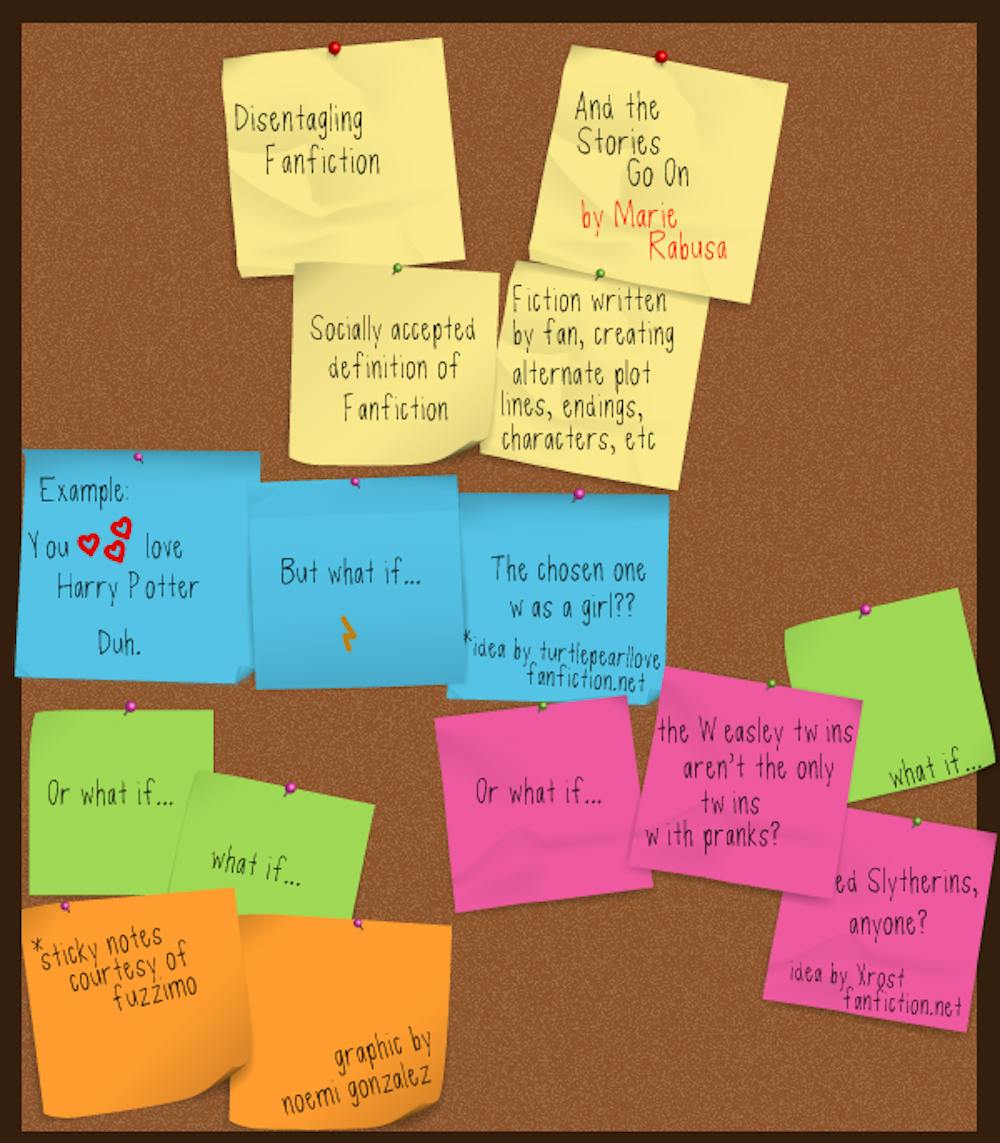Fandom. Crossover. AU. Lemon. Slash.
These are simple terms that also seem incredibly displaced and somehow foreign. Perhaps you have heard them in passing, or have seen them as you navigated various social media sites.
This is the language of fanfiction.
While fanfiction has always held a place in literature, it is commonly known today as an element of internet subculture. Fanfiction.net is the most popular site for fan-created fiction, which revolves around characters from popular literature, comics, television and movies.
Fanfiction in its internet-rooted state has recently been propelled into popular media. Novels such as Rainbow Rowell’s “Fangirl” portray a protagonist who is a fanfiction writer, and the “Fifty Shades” trilogy is based on a Twilight fanfiction story.
Despite its popularity, those who enjoy fanfiction are often silenced by the stigma that surrounds it. Fanfiction can seem taboo and may represent various things—social awkwardness, nerdiness and a heightened appeal for sexuality, are a few personalities that have been placed upon fanfiction, and those who read it.
Sanchez started out with low expectations for fanfiction stories, and she had little interest in the stories when she first learned of them. She began reading fanfiction during her first semester at ASU, and she has written stories based on the J.K. Rowling’s “Harry Potter” series.
“It’s a bit of a silly reason, but I actually started reading fanfiction after a rather nasty breakup,” she says. “The stories were short and accessible enough that they provided a distraction without requiring too much of my time.”
The common sentiment that leads people to read fanfiction is that they wished the story never ended. Or that their favorite couple should have been together, but, man, those writers were just teasing. Sanchez began to write fanfiction out of necessity, not being able to find storylines that would suit what she likes.
“I had a lot of ideas and lives I wanted to experience through the magic of reading, but I wasn’t able to find those things written down,” she explains. “So I decided that if I wanted to read certain plots, I’d have to write them myself.”
Dan Gillmor, a professor and the director of the Knight Center for Digital Media Entrepreneurship at the Cronkite School of Journalism, strongly supports fanfiction and the ability of consumers to build on the works of others. He also believes fanfiction plays a role in media literacy.
“Fanfiction strikes me as a great way for people to become media creators, which is an essential part of media literacy,” he says.
In May 2013, Amazon created a service called Kindle Worlds, allowing fanfiction writers to sell and make a profit through the Kindle Store. What was previously seen as recreating the work of others, has merged with traditional authorship, and has become a major facet of literature.
The internet plays a major role in the growth of fanfiction as a business venture, a learning tool and a means of alleviating the stigma that surrounds the writing.
“I’m sure it’ll overcome any stigma that may exist today, because so much of what we read—and listen to and watch—is going to be in digital form over time,” says Gillmor.
Sanchez agrees that while fanfiction is growing as a field of literature, it will also one day lose its stigma.
“Just like ‘geek culture’ has become more mainstream—look at all these superhero movies—I think fanfiction will lose its stigma someday and venture into the light of ‘normal society’,” she says.
Fanfiction carries many aspects of “normal society”, such as community and partnership. The different fiction sites, such as Archive of Our Own, allow authors to create communities with those who write within the same fandom.
“Thanks to reviews, you are constantly getting feedback and your writing is constantly improving,” Sanchez clarifies.
Writing this type of fiction also improves writing in the same way that a writing assignment would, only using more creativity. Sanchez praises fanfiction for its positive attributes as they pertain to honing writing skills.
“The pros are endless,” she explains. “Your writing improves. Your grammar improves. Your vocabulary improves.”
In cultivating writing skills, fanfiction also frees the creative process for those writers who fear the binding organization of publishing companies and editors.
“I’ve read pieces that are unlike anything I’ve ever stumbled across in the bookstore, and I’m excited for the day when these writers expand their work and begin to create original pieces,” Sanchez says.
As fanfiction grows in popularity, the hope is that everyone becomes more informed about what fanfiction isn’t, and especially what it is. And perhaps, one day, reading fanfiction will not always have to feel like a secret.
“Anyone who has ever fallen in love with a book can tell you how sad it is when stories come to an end,” she says. “The beauty of fanfiction is that those stories can continue as long as fans with imagination remain.” Reach the writer at marie.rabusa@asu.edu or on Twitter @marie_eo





